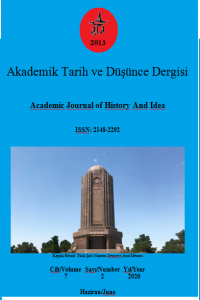Hasan Âli Yücel-Kenan Öner Davasının Türk Basınına Yansıması
Uluslararası ve ulusal şartların değişmesi yanında, Çiftçiyi Topraklandırma Kanunu ile başlayan tartışma, çok partili hayata geçişi hızlandırmıştır. Önce muhalefet partileri ortaya çıkmış ve arkasından iktidar-muhalefet tartışması başlamıştır. Bu ortamda Türkiye’de, farklı fikir akımları da taraftar bulmuştur. Bunlara arasında milliyetçilik ve komünizm, ilk dikkat çekenler olmuştur. Çalışmanın konusu olan Hasan Âli Yücel-Kenan Öner davası da 1944’teki Irkçılık-Turancılık davasının bir uzantısı şeklinde gelişmiştir. 1944’te milliyetçiliğin önde gelen isimleri yargılanmıştır. 1947’de ise komünizm ve Köy Enstitüleri üzerinden dönemin Milli Eğitim Bakanı Hasan Âli Yücel ve Kenan Öner mahkemeleşmiştir. Dönemin İçişleri Bakanının Meclis konuşması ile başlayan tartışma, basın üzerinden yayınlanan açık mektuplar ile alevlenmiş, hakaret davasına dönüşmüş ve sonunda siyaseti, memleketi ve basını uzun süre meşgul eden bir yangın halini almıştır. 17 Nisan 1947’de başlayan dava 19 Kasım 1947’de sona ermiş ve Kenan Öner suçsuz bulunmuştur. Davanın temyize götürülmesi ile uzayan süreç, 22 Aralık 1949’da tamamen sona ermiştir. Mahkeme aşaması basında geniş yankı bulmuştur.
Anahtar Kelimeler:
Hasan Âli Yücel, Kenan Öner, Komünizm, Irkçılık, Turancılık, Köy Enstitüleri.
Reflectıon Of Hasan Âli Yücel and Kenan Öner’s Case On The Turkısh Press
With the change in international and national conditions, the debate that began with the Farmer Grounding Law (FGL) accelerated the transition to a multi-party system in Turkey. First of all, opposition parties emerged, and then the debate between government and opposition began. In this heightened political atmosphere, different movements of thought also gained supporters in Turkey. Nationalism and Communism were the first to draw attention to these movements. The case between Hasan Âli Yücel and Kenan Öner (Yücel-Öner case) developed as an extension of the Racism-Turanism case of 1944. In 1944, the leading figures of nationalism were tried. In 1947, the then Minister of National Education Hasan Âli Yücel and Kenan Öner ended up in court over Communism and the Village Institutes. The debate, which began with the speech of the Minister of the Interior in the parliament, gradually harshened through open letters published in the press. It turned into a defamation case and eventually became a critical problem that occupied politics, the country, and the media for quite some time. The action that began on April 17, 1947 was closed on November 10, 1947 and Kenan Öner was found innocent. The process, however, continued due to the appeal of the case, and did not end wholly until December 22, 1949. The court case received widespread coverage in the press.
Keywords:
Hasan Âli Yücel, Kenan Öner, Communism, racism, Turanism, Village Institutes,
___
- ERTEN, Muammer, Topraktan Parlamentoya, Boyut Yayınları, İstanbul, 2010.
- GOLOĞLU, Mahmut, “Milli Şef Dönemi (1939-1945)”, Kalite Matbaası, İstanbul, 1974.
- KIRBY, Fay, Türkiye’de Köy Enstitüleri, İmece Yayınları, İstanbul, 1962.
- MUMCU, Uğur, 40’ların Cadı Kazanı, Tekin Yayınevi, 8.b, İstanbul, 1993.
- ÖNER, Kenan, Öner ve Yücel Davası I, Kenan Matbaası, 2.b, İstanbul, 1947.
- Yayın Aralığı: Yılda 6 Sayı
- Başlangıç: 2013
- Yayıncı: Hakan YILMAZ
Sayıdaki Diğer Makaleler
Kazakistan Araştırmaları Derneği Aktöbe Şubesi Örneğinde Kazakistan’da Siyasî Baskı
Ercan ÇELEBİ, Begimbayeva ZHİBEK SAGİNBAEVNA
Elvan ESER, Veli Ulaş ASMADİLİ
Sumer Toplum Felsefesinin İzlerinin Atasözleri ve Deyimler Üzerinden Takip Edilmesi
Ortaçağ’da İran’da Farsça Tarih Yazım Geleneği
Roma Döneminde Alanya’nın Genel Görünümü
Uygur Harfli Oğuznamedeki Hayvanlarla Oğuz Kağan’ın İlişkisi
Amerika romanının əsas inkişaf mərhələləri haqqında (XX əsrin birinci yarısı)
Nahçıvan Özerk Cumhuriyetinde Tarımın Durumu (1991-2016 yılları)
Avrasya Ekonomik Birliği Çerçevesinde İşçi Göçlerin Düzenlenmesi
